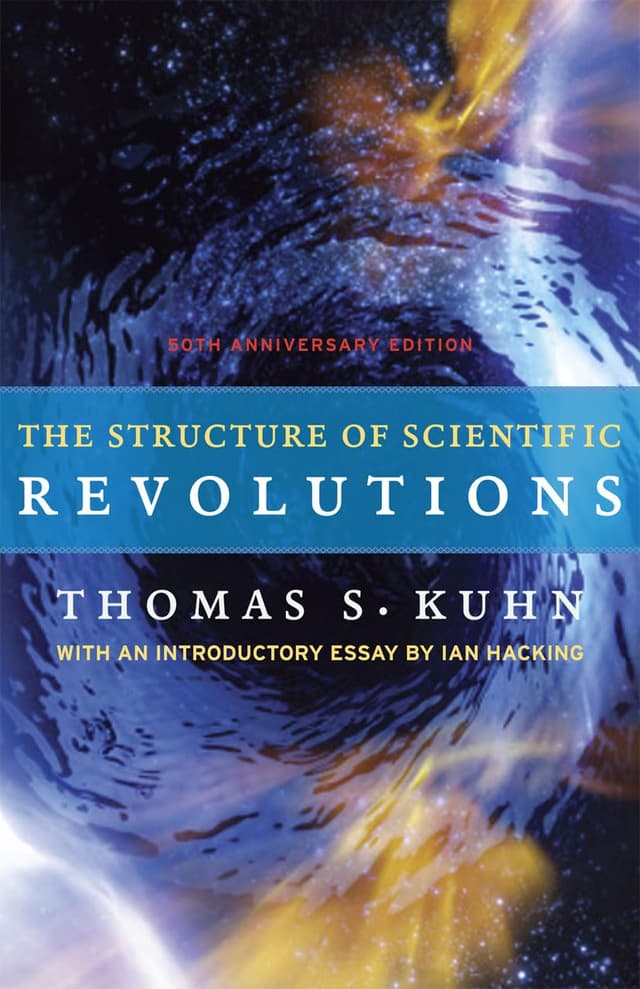Noah Brier | June 3, 2020
Why is this interesting? - The Paradigm Edition
On ideas, science, and large-scale shifts in understanding
Recommended Products

A book by Thomas Kuhn that explores how scientific ideas emerge and the importance of paradigms in understanding scientific development.
Noah here. The models we use to understand the world can be wrong for a variety of reasons. They can be too simple or too complicated, rely on data that may not exist or be correct, or just be a fundamental misunderstanding of how whatever it is they’re trying to model actually works. There’s also a whole class of models that are now widely understood to be wrong but at some point were believed to be right. In science, for instance, some of the most famous minds were ultimately shown to be mistaken in their thinking. They’re often celebrated for their breakthroughs, but the paradigm they relied on has long since been left behind.
While most scientists we encounter in textbooks were focused on things like quarks and Plancks, there is a whole field of philosophy devoted to understanding the impacts and methods of science. Two of the more well known in the field are Karl Popper, who famously argued that what makes science science is its ability to be falsified, and Thomas Kuhn, who explored how scientific ideas emerge and the importance of paradigms on our understanding of them.
Why is this interesting?
Trained as a physicist, Kuhn’s big epiphany, and subsequent exit from the field in favor of philosophy, came from reading Aristotle as a graduate student. He was stumped by the great thinker’s poor grasp of both observational and theoretical science. “Aristotle appeared not only ignorant of mechanics,” Kuhn wrote in 1981, “but a dreadfully bad physical scientist as well.” But how could that be? Aristotle is indisputably one of the greatest thinkers to ever walk the earth, with contributions in logic, physics, astronomy, geology, ethics, and just about any other field you could name. The young Kuhn searched for some kind of explanation that could help make sense of the seemingly impossible gulf between the Greek sage’s impact and his grasp of the basics. The light bulb went off while staring out his window. Suddenly he was struck by the fact that Aristotle’s world, all the way down to the words he used to describe his science, was fundamentally different than the one Kuhn inhabited in 1947. That world, of course, was one that operated within the bounds of Newton’s Laws of Motion, which had ruled physics since their introduction in the late-1600s.
Kuhn said that revolutionary changes, like the one Newton brought, “involve discoveries that cannot be accommodated within the concepts in use before they were made.” He called these revolutionary changes paradigms in his 1968 book The Structure of Scientific Revolutions and explained that they fundamentally shape every aspect of how we think about the world. “Like the transition to Newton’s Laws of motion, they involved not only changes in Laws of nature but also changes in the criteria by which some terms in those laws attached to nature.”

A simplified version of Kuhn’s model from a 1997 HBS Working Paper by Clayton Christensen titled “Competitive Advantage: Whence It Came, and Where It Went”
Science, in other words, is not just some kind of linear march forward with knowledge building on itself, but rather, it is defined by the introduction of new paradigms that reset each age’s agenda alongside its metaphors, theories, and models. The introduction of a paradigm begins the work of “normal science”, which Kuhn controversially suggested was more about “puzzle-solving” than questioning the revolution in any significant way. "Normal science,” the philosopher Ian Hacking writes in the preface to the new edition of Structure, “does not aim at novelty but at clearing up the status quo. It tends to discover what it expects to discover."
In proffering this theory of science, Kuhn was describing a meta-model for how knowledge proceeds. We live within a framework of understanding, building it upwards and outwards with new knowledge. As we explore, we find anomalies, squashing them by extending the foundational model until enough build up that there’s no choice but to shift to a new paradigm. (NRB)
Podcast of the Day:
Courier, the UK-based business publication, has a solid podcast that discusses the ins and outs of small business, particularly the challenges and creativity presented in Covid. It is deftly hosted by friend of WITI Danny Giacopelli, who is an incredibly engaging host. I made a cameo to talk about travel on this episode, but worth subscribing to all of them with your podcast app of choice. (CJN)

Quick Links:
Japanese banks to link e-money with popular Suica transit card (CJN)
The re-opening of Singapore (CJN)
The ultraviolet lights used to clean NYC subways (CJN)
Thanks for reading,
Noah (NRB) & Colin (CJN)
—
Why is this interesting? is a daily email from Noah Brier & Colin Nagy (and friends!) about interesting things. If you’ve enjoyed this edition, please consider forwarding it to a friend. If you’re reading it for the first time, consider subscribing (it’s free!).